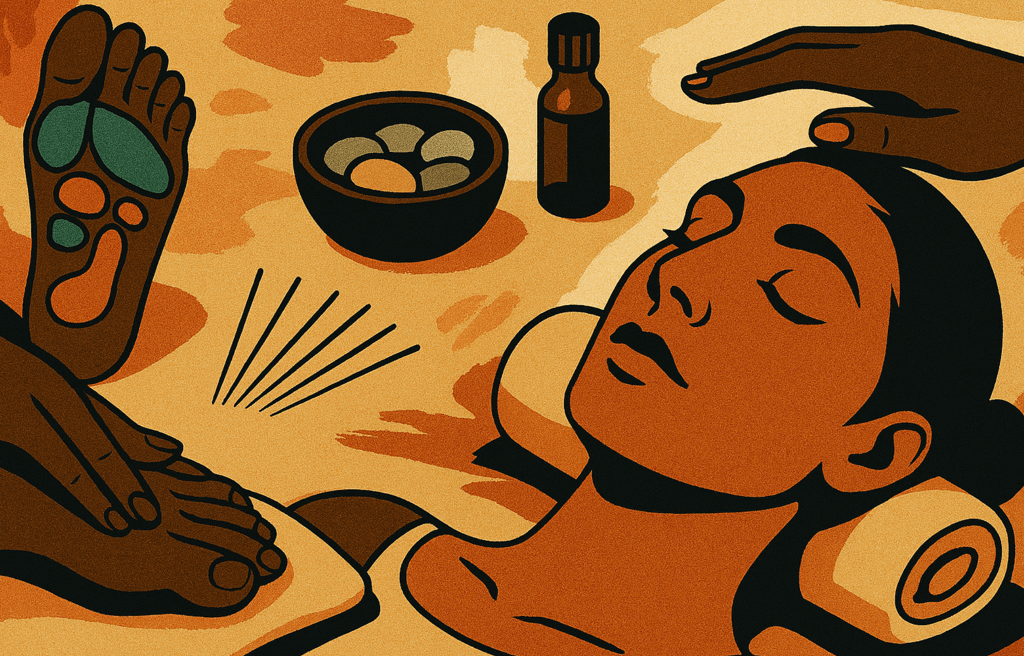Holistic Therapies: Acupuncture, Reflexology, Hypnotherapy
Holistic Therapies within IVF. How acupuncture, reflexology, and hypnotherapy may support IVF — including what the evidence says and how to choose the right holistic care for you.


When you're navigating fertility treatment, especially IVF, it's only natural to want to explore every possible way to boost your chances. For many, that includes looking beyond traditional medicine and into complementary or "holistic" therapies — practices that support the whole body and mind. Among the most popular are acupuncture, reflexology, and hypnotherapy.
But do these treatments actually help? Can they reduce stress? Improve outcomes? Or are they just expensive wellness add-ons?
In this post, we’ll take an honest, balanced look at these therapies, what the science says, and how to decide if they might be right for you.
What Do We Mean by “Holistic Therapies”?
Holistic therapies focus on supporting the mind, body, and emotional state together — the idea being that your physical and mental wellbeing are deeply interconnected. They're often used alongside conventional fertility treatment rather than as replacements. You might hear them described as “complementary” or “adjunct” therapies.
Here, we’ll explore:
Acupuncture
Reflexology
Hypnotherapy
Acupuncture and IVF: Ancient Practice, Modern Interest
Acupuncture is perhaps the best-known complementary therapy used during IVF. It involves inserting very fine needles into specific points on the body to stimulate energy flow (known as “qi” in Chinese medicine) or, from a Western perspective, to influence the nervous system and blood flow.
Potential Benefits:
May improve blood flow to the uterus and ovaries
Can reduce stress and anxiety, which may help hormonal balance
Some studies suggest it may improve IVF outcomes — especially when done on the day of embryo transfer
What Does the Science Say?
The evidence is mixed. Some studies show a modest improvement in IVF success rates with acupuncture, especially when performed before and after embryo transfer. Other trials find no difference at all.
A 2018 meta-analysis in BMJ suggested that acupuncture might be beneficial when done around the time of embryo transfer — but cautioned that the placebo effect could be strong. That doesn’t mean it doesn’t help — just that its benefit may come through relaxation and stress reduction rather than direct physical mechanisms.
Worth noting: The UK’s National Institute for Health and Care Excellence (NICE) does not currently recommend acupuncture to improve fertility outcomes, but they do acknowledge it may help with relaxation.
Reflexology: Footwork for Fertility?
Reflexology involves applying gentle pressure to specific points on the feet (or sometimes hands and ears) believed to correspond to different organs and systems in the body. Reflexologists believe that by working on these pressure points, they can encourage balance and healing.
Claimed Benefits:
Stress reduction
Hormonal regulation
Improved circulation and lymphatic flow
Better sleep and mood during IVF cycles
What Does the Science Say?
Unlike acupuncture, reflexology has much less scientific backing. The few small studies that exist tend to focus on general wellbeing rather than measurable IVF outcomes. That said, many people report feeling calmer, more grounded, and more positive after sessions.
If your goal is emotional support and stress relief, reflexology may offer a gentle and enjoyable way to unwind during a difficult time — as long as you're aware that it's not a proven fertility treatment.
Hypnotherapy: Rewiring the Mind-Body Connection
Hypnotherapy involves guided relaxation and focused attention to help shift thought patterns, reduce stress, and improve emotional resilience. In the context of fertility, it's often used to reduce fear, anxiety, and even subconscious blocks around conception or pregnancy.
Possible Benefits:
Helps reduce stress hormones like cortisol
May support healthier sleep and emotional regulation
Can help people process trauma or fears linked to past losses or failed IVF attempts
Some therapists specialise in “fertility hypnotherapy” and offer tailored sessions
What Does the Science Say?
There’s no direct evidence that hypnotherapy boosts IVF success rates. But there is good evidence that reducing stress and improving mental health can support hormone balance and treatment adherence — two factors that may indirectly affect outcomes.
It can be particularly helpful for people with high anxiety, past trauma, or needle phobia, and for those wanting to feel more in control of a process that often feels overwhelming.
So… Can Holistic Therapies Really Help with IVF?
They may not be magic bullets — but they can be meaningful tools for emotional support.
TherapyMay Help WithScientific SupportNotesAcupunctureStress, blood flow, possibly implantationModerateMost promising if done around embryo transferReflexologyRelaxation, mood, sleepLimitedMore anecdotal than evidence-basedHypnotherapyStress, anxiety, emotional processingModerateGreat for psychological support
The mind-body connection is real. While none of these therapies guarantee a successful cycle, they may help you feel more in control, calmer, and emotionally nourished during a time that can be all-consuming.
Choosing the Right Complementary Therapy for You
Before diving in, ask yourself:
What am I hoping to gain? (Relaxation, physical benefit, emotional support?)
Do I feel safe and comfortable with this therapist?
Can I afford this treatment alongside IVF costs?
Is the practitioner properly trained and insured?
Always tell your fertility team about any additional therapies you’re trying — even if they’re non-invasive. And be cautious of any therapist who promises miracles or says they can “guarantee” success.
Holistic therapies aren’t a replacement for IVF — but they can help you care for your whole self during the process. Whether it's lying quietly during acupuncture, breathing deeply in a hypnotherapy session, or simply having a moment of calm while someone massages your feet, these small rituals of care can have real value.
Because IVF isn’t just a medical journey. It’s a deeply emotional one — and it’s okay to seek comfort wherever you find it.
© 2025. All rights reserved.
